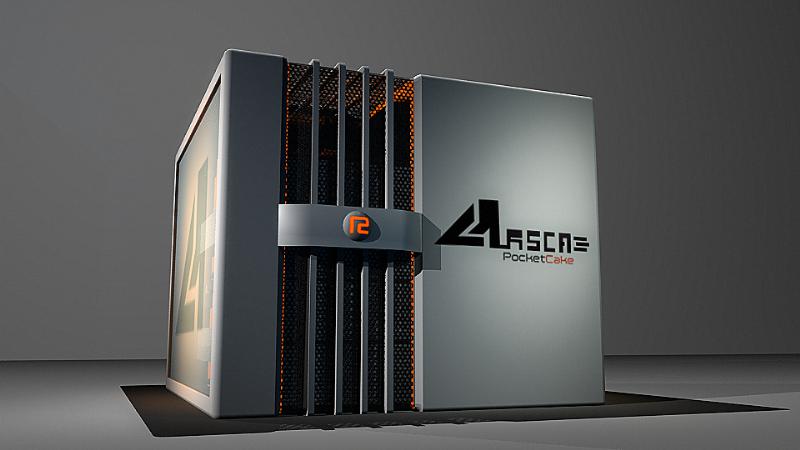A new product from PocketCake, called VRSCA (for Virtual Reality Simulation Converter Assembly), is three times more powerful than the average high-performance computer and allows for up to eight people to experience a virtual reality simulation at the same time.
VR enables users to experience immersive, computer-generated 3D environments through the use of specialized headsets and state of the art modeling software. Since the price of VR headsets and software has dropped significantly in recent years, developers are limited only by their imaginations and processing efficiency.
PocketCake is releasing a new product, the VRSCA (for Virtual Reality Simulation Converter Assembly), to remove the limits on processing power and setting developers' imaginations free.
Most computers are not equipped to handle the massive volume of data contained in a typical VR simulation file. A high performance laptop computer can process the data necessary to simulate a 25,000 square-foot building at a frequency of 25 frames per second.
By contrast, VRSCA processes the same model at 80 frames per second. A 100,000-square-foot model with defined interior and dynamic lighting would crash the average high-powered computer. VRSCA, on the other hand, runs the simulation with ease: no lag; no overheating.
VRSCA allows for up to eight people, wearing headsets such as the Oculus Rift, to experience a virtual reality simulation in the same room at the same time.
Virtual reality simulations for multiple viewers
VRSCA is available in four models: a single viewer, a dual viewer, a 4-person viewer and an 8-person viewer. The single, dual and 4-person viewers are portable. Each VRSCA is capable of hosting as many as 58 viewers remotely. This means simulations can be viewed simultaneously by 58 viewers in different locations.
VRSCA can be equipped with options such as a controller that allows for easy navigation through a simulation and the ability to change spawn points and control lighting.
Stanford graduate and hardware engineering manager for QuEST Rail, Matt Rogge PhD, EE is overseeing design and production of VRSCA. Dr. Rogge's knowledge and experience in railroad control electronics and digital systems provides a key element to the VRSCA project's success.
For more information, visit: www.pocketcake.com/vr.html.
Related Stories
Healthcare Facilities | Dec 19, 2023
A new hospital in Duluth, Minn., is now the region’s largest healthcare facility
In Duluth, Minn., the new St. Mary’s Medical Center, designed by EwingCole, is now the largest healthcare facility in the region. The hospital consolidates Essentia Health’s healthcare services under one roof. At about 1 million sf spanning two city blocks, St. Mary’s overlooks Lake Superior, providing views on almost every floor of the world’s largest freshwater lake.
Government Buildings | Dec 19, 2023
New Pennsylvania State Archives building holds documents dating back to 1680
Work was recently completed on a new Pennsylvania State Archives building in Harrisburg, Penn. The HGA-designed, 146,000-sf facility offers numerous amenities, including computers, scanners, printers, a kitchenette with seating, lockers, a meeting room, a classroom, an interactive video wall, gallery, and all-gender restrooms. The features are all intended to provide a welcoming and comfortable environment for visitors.
Urban Planning | Dec 18, 2023
The impacts of affordability, remote work, and personal safety on urban life
Data from Gensler's City Pulse Survey shows that although people are satisfied with their city's experience, it may not be enough.
MFPRO+ News | Dec 18, 2023
Berkeley, Calif., raises building height limits in downtown area
Facing a severe housing shortage, the City of Berkeley, Calif., increased the height limits on residential buildings to 12 stories in the area close to the University of California campus.
Green | Dec 18, 2023
Class B commercial properties gain more from LEED certification than Class A buildings
Class B office properties that are LEED certified command a greater relative benefit than LEED-certified Class A buildings, according to analysis from CBRE. The Class B LEED rent advantage over non-LEED is about three times larger than the premium earned by Class A LEED buildings.
Codes and Standards | Dec 18, 2023
ASHRAE releases guide on grid interactivity in the decarbonization process
A guide focusing on the critical role of grid interactivity in building decarbonization was recently published by ASHRAE. The Grid-Interactive Buildings for Decarbonization: Design and Operation Resource Guide provides information on maximizing carbon reduction through buildings’ interaction with the electric power grid.
Architects | Dec 18, 2023
Perkins&Will’s new PRECEDE tool provides access to public health data to inform design decisions
Perkins&Will recently launched a free digital resource that allows architects and designers to access key public health data to inform design decisions. The “Public Repository to Engage Community and Enhance Design Equity,” or PRECEDE, centralizes demographic, environmental, and health data from across the U.S. into a geospatial database.
Sports and Recreational Facilities | Dec 15, 2023
San Antonio Spurs’ new practice facility aims to help players win championships and maintain well-being
Designed by ZGF, the Victory Capital Performance Center uses biophilic design to promote better health and wellness on and off the court.
Affordable Housing | Dec 14, 2023
What's next for affordable housing in 2024?
As 2023 draws to a close, GBBN’s Mary Jo Minerich and Amanda Markovic, AIA sat down to talk about the future. What’s next in terms of trends, technology, and construction of affordable housing?
75 Top Building Products | Dec 13, 2023
75 top building products for 2023
From a bladeless rooftop wind energy system, to a troffer light fixture with built-in continuous visible light disinfection, innovation is plentiful in Building Design+Construction's annual 75 Top Products report.

















